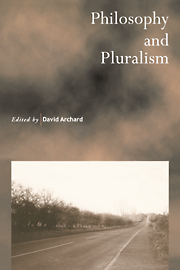Book contents
- Frontmatter
- Contents
- Notes on Contributors
- Introduction
- Philosophy in Different Cultural Contexts
- A Case for Philosophical Pluralism: The Problem of Intentionality
- William James, ‘A Certain Blindness’ and an Uncertain Pluralism
- Cultural Realism: the ancient philosophical background
- Religion and Pluralism
- A Single True Morality? The Challenge of Relativism
- Pluralism, Realism and Truth
- Value-Pluralism
- Moral Philosophy and its Anti-pluralist Bias
- Coping with the Many-Coloured Dome: Pluralism and Practical Reason
- Rawlsians, Pluralists, and Cosmopolitans
- Political Liberalism, Secular Republicanism: two answers to the challenges of pluralism
- ‘Race’ in Britain and the Politics of Difference
- Tragedy, Moral Conflict, and Liberalism
- References
A Case for Philosophical Pluralism: The Problem of Intentionality
Published online by Cambridge University Press: 30 October 2009
- Frontmatter
- Contents
- Notes on Contributors
- Introduction
- Philosophy in Different Cultural Contexts
- A Case for Philosophical Pluralism: The Problem of Intentionality
- William James, ‘A Certain Blindness’ and an Uncertain Pluralism
- Cultural Realism: the ancient philosophical background
- Religion and Pluralism
- A Single True Morality? The Challenge of Relativism
- Pluralism, Realism and Truth
- Value-Pluralism
- Moral Philosophy and its Anti-pluralist Bias
- Coping with the Many-Coloured Dome: Pluralism and Practical Reason
- Rawlsians, Pluralists, and Cosmopolitans
- Political Liberalism, Secular Republicanism: two answers to the challenges of pluralism
- ‘Race’ in Britain and the Politics of Difference
- Tragedy, Moral Conflict, and Liberalism
- References
Summary
In what sense can we speak of pluralism regarding the philosophical traditions or styles crudely characterised as ‘Continental’ and ‘Analytic’? Do these traditions address the same philosophical problems in different ways, or pose different problems altogether? What, if anything, do these traditions share?
Studying philosophical pluralism means examining each area and each issue separately to avoid unhappy generalisations about traditions, their methods, starting points, and presuppositions. Here I propose examining philosophical pluralism with respect to a single issue: intentionality. In what sense can intentionality serve as a test case for pluralism? Intentionality is in a sense privileged by being located both at the origins of Continental phenomenology and quite centrally in contemporary analytic philosophy of mind. Highlighted in certain strands of both traditions (e.g. Husserl, Searle), it is downplayed or displaced in other strands (e.g. Derrida, Quine). Its historical role and its contemporary locus, then, may be sufficient reasons for examining intentionality as an interesting case of pluralism.
It is no longer credible to do philosophy without attention to the history of philosophy (Dummett, 1993), and analytic philosophy has become more conscious of its historical lineage. The historical roots and configurations of the concepts associated with intentionality offer a fruitful way of examining pluralism. Concepts have histories; or, better, concepts are their histories. Furthermore, these histories are not autonomous, there is almost always some cross-fertilisation, some shared influences. Our study of pluralism, then, opens with some reflections on the history of the problematic of intentionality.
- Type
- Chapter
- Information
- Philosophy and Pluralism , pp. 19 - 32Publisher: Cambridge University PressPrint publication year: 1996
- 1
- Cited by



